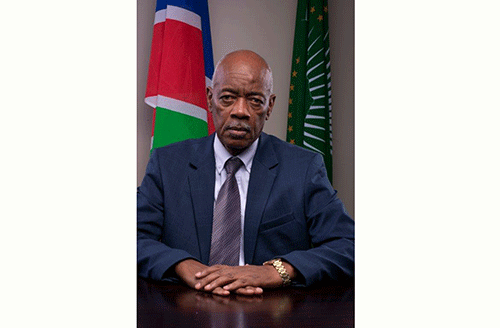The Winter of Our Discontent is John Steinbeck’s last novel, published in 1961. Steinbeck was an American novelist and the 1962 Nobel Prize in Literature winner. The title comes from the first two lines of William Shakespeare’s Richard III: “Now is the winter of our discontent…” However, ours is not the winter of discontent; ours is a winter of sorrows. The devastation and sorrow that Covid-19 has caused since its outbreak last year but especially in these last two months are beyond compare.
Never in recent human memory has something like this been experienced before. The virus does not seem to discriminate between nationality, race, ethnicity and social class. The medical fraternity, governments as well as the religious world are grappling for answers. In the month of June, Namibia’s infection rate was said to be one of the highest – if not the highest in the world. According to the latest reports, Botswana is said to have overtaken us – and last week, their daily infection rate was averaging at six thousand.
Philosophy is the fundamental nature of knowledge, reality and existence. This “queen” of all academic disciplines, amongst other things, also ponders issues around life and death. It also instructs us that every historical epoch, with its joys and sorrows, produces great works of art, ranging from song, poetry and other artistic expressions.
I am a regular listener of Omurari radio station – and already, there are a few songs sung by our young people about Covid-19. It is an ironic twist of fate that one of the finest actors Namibia has ever produced, David Ndjavera, has also “bowed out” from the stage of life due to this deadly disease. I am sure if he was alive, we would soon have a play or movie about Covid-19.
The Government of the Republic of Namibia, under the able leadership of Dr Hage Geingob, is trying all it can to curb the virus. Their efforts range from intensified information campaigns to vaccination and other health protocols. I think every Namibian should really appreciate the efforts of government. In these difficult times, there is need for cross fertilisation of ideas between government, civil society organisations and the academic world.
When Covid-19 emerged last year, government showed strong leadership and ownership of the situation by activating a National Health Emergency Coordination Committee under the Ministry of Health and Social Services (MoHSS). The Namibian government has furthermore introduced the Incident Management System (IMS) and strengthened the functionality of the National Public Health Emergency Operation Centre (NPHEOC), which has become the central base where all Covid-19 responders at the national level are operating from.
The government brought all its sectors, development partners, private sector and civil society on board and developed a Multi-Sectoral National Response Plan for Covid-19 in Namibia, which resulted into a whole-of-government, whole-of-society response campaign, led by the Head of State with senior leadership of numerous government ministries.
In recent years – at the global level – there has been a change in emphasis away from structural devolution, disaggregation and single-purpose organisations towards a more integrated approach to public service delivery. Variously termed “one-stop government”, “joined-up government” and “whole-of-government”, the movement from isolated silos in public administration to formal and informal networks has become a global trend.
This is driven by various societal forces, such as the growing complexity of problems that call for collaborative responses, the increased demand on the part of citizens for more personalised and accessible public services, which are to be planned, implemented and evaluated with their participation and the opportunities presented by the Internet to transform the way the government works for the people. This is even more imperative during periods of crises, like the Covid-19 pandemic.
Whole-of-Government Approach (“WGA”) refers to the joint activities performed by diverse ministries and agencies to provide a common solution to particular problems or issues. The approach and content of the initiatives can be formal or informal. Areas covered can be related to policy development, project management and service delivery.
Structural reforms performed within public administrations during the past decades have introduced this new methodology, which aims to improve the coordination of service delivery. WGA also seeks to introduce coherence in the decision-making process of public administrations.
The whole-of-government approach is the ability of agencies to work together and citizens to engage in wide-ranging dialogue with government. This becomes important in the context of putting e-government to the service of inclusive and people-centred sustainable development. Integrated policy approaches, enabled by cohesive institutional mechanisms and modern technology, contribute to the overall objectives of long-term development while lending greater legitimacy to government activities.
The US Department of Health and Human Services (HHS) has, for example, published its quadrennial strategy to safeguard the nation’s health in times of crisis. The 2019-2022 National Health Security Strategy (NHSS) provides a vision to strengthen the nation’s ability to prevent, detect, assess, prepare for, mitigate, respond to and recover from disasters and emergencies.
This strategy focuses on three overarching objectives – 1: prepare, mobilise and coordinate a whole-of-government approach; 2: protect the nation from the health effects of emerging and pandemic infectious diseases and chemical, biological, radiological and nuclear (CBRN) threats, and 3: leverage the capabilities of the private sector.
Another outgrowth of WGA is the Whole-of-Nation approach (WNA), which is gaining ascendancy as a holistic theory of Public Administration in helping to tackle key national and global issues. Unlike WGA, WNA is more comprehensive as an approach to governance that also takes into account actors and players, which are not associated with the State. The Namibian government seems to have taken the WNA approach in dealing with the Covid-19 pandemic and we commend them for that.


